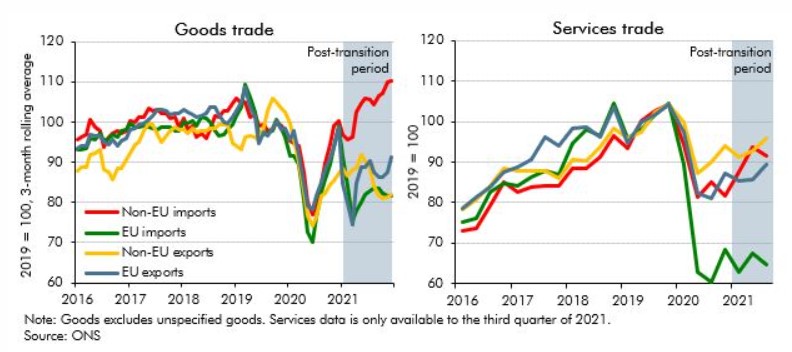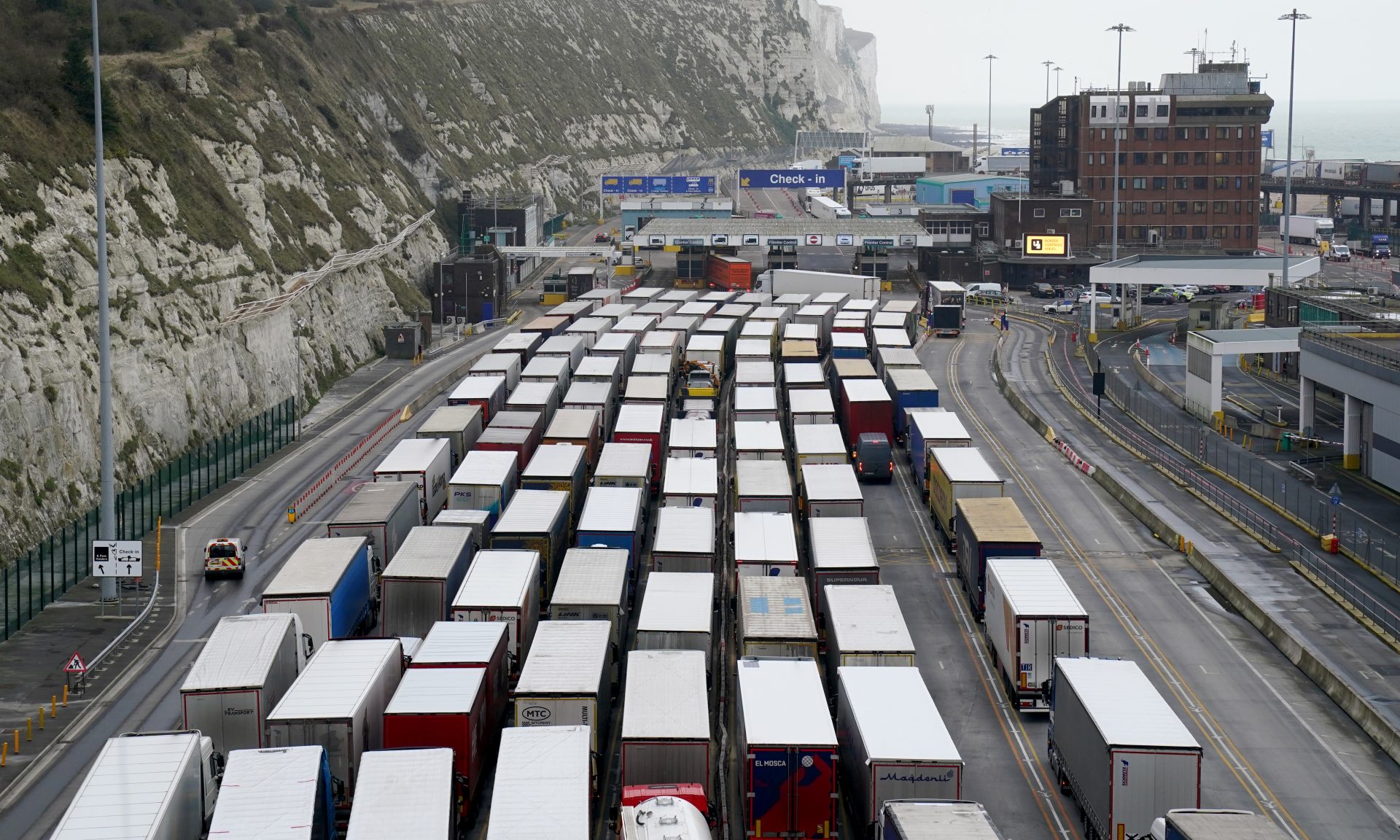Trade deficits are funny things, sometimes they matter and sometimes they don’t. In the 1950s, 60s and 70s they were huge news, government’s sweated over each month’s figures. Harold Wilson’s 1970 re-election campaign was, he claimed, lost because of a small trade deficit caused by the early arrival of two new jumbo jets. Now we just don’t seem to care.
But perhaps we should start caring about them again. The UK’s trade, like that of many other countries, was massively damaged by the Covid pandemic, but unlike the rest of the world it has not recovered. Covid managed to hide the hit to exports and imports that it was always predicted Brexit would cause and now the damage from Covid is disappearing the facts are becoming clearer.
UK trade with the rest of the world is down by 12-13% according to the Office for Budget Responsibility (OBR), the chancellor’s own economic watchdog. This is exactly what was expected to happen after Brexit, and now the evidence is too obvious to ignore. In fact, the OBR originally thought it would take 10 years of Brexit to reduce trade by 15%. It has taken just over a year and we are nearly there already.
Even the chancellor had to admit as much, telling the Treasury Select Committee that the UK’s terrible trade performance “might well be because of Brexit”, and “it was always inevitable if you change the exact nature of your trading relationship with the EU, that was always going to have an impact on trade flows”.
An amazing admission from a confirmed Brexit supporter and guardian of the country’s economic prosperity, he is basically saying -we always knew Brexit would damage trade with the EU and now it is.
It is impossible to imagine the Leave campaign saying that in 2016 and winning, but they knew it was the case all along.
Hardly surprising, therefore, that Rishi Sunak has reportedly developed a “visceral hatred” of the OBR. No one likes having their homework marked and the results posted for everyone to see, not when the results show that your own economic policies are damaging the country.
The sensible thing to do would be to change your policies but this government finds it much easier to shoot the messenger.
That’s a pity because these falls in trade are and will continue to have a damaging effect on the British economy. As the OBR explained “In the fourth quarter of 2021, exports and imports were respectively still 13% and 12% below their 2019 averages” and that “the recovery in UK trade has also been slow relative to advanced economies as total advanced economy goods exports already exceed pre-pandemic levels by 3%” which suggests “Brexit may have been a factor.”
In other words, while the rest of the world has seen trade rise by 3% since the end of Covid, in the UK it is still far lower. If the UK had performed like the rest of the world our trade would be 15 or 16% higher than it is at the moment.
Also, the figures do not just come from the British trade data. You can see very similar figures in the trade statistics gathered by other countries, including Germany, showing that their fall in imports from and exports to the UK mirror the figures gathered by the ONS here. This strongly suggests this is not some unfortunate miscalculation or caused by a change in the way the figures are collected or collated.
So, what is causing this disastrous collapse in trade? Simply put the UK government has made exporting and importing more difficult and costly.

Look at the queues at Dover. They aren’t all caused by the shameless policies of P&O Ferries, they are also the result of Brexit and the lack of preparation for Brexit by the government. It failed to prepare and its much-vaunted claim to create “the best border in the world” was always a cynical joke. The computer system at Dover has collapsed and putting checks, delays, and billions of pounds worth of red tape onto imports and exports was no way to create a better border, let alone “the best”.
HMRC calculated that the new form filling necessitated by Brexit cost £13bn a year in red tape, that is an annual £13bn added cost to exporters and importers.
The new checks, many of which have not been fully introduced yet, create delays and added expense.
We were told that we would have exactly the same or even better access to the EU’s Single Market after Brexit. It was a lie and companies the length and breadth of the country are suffering as a result.
Small and medium-sized companies are being hit the hardest; they cannot afford these added costs like big firms can and for many the game is just not worth the candle anymore. They will stop exporting or importing and just serve the domestic market. Larger firms can afford to change their systems to cope with the new regime but will just pass the costs on to their customers. Imports into the UK are also being hit, as many foreign firms decide they cannot be bothered to wade through this morass of new obstacles just to get to their old customers, let alone new ones, and they, therefore, stop trading with the UK.
This matters for numerous reasons. For a start, the Brexit dream of a Global Britain exporting more once the dead hand of Brussels was lifted, turns out to be not just a fantasy but the opposite of the truth. Trade is down not up, the trade deals that the government has negotiated or rolled over are so unimportant that the effects are too small to be measured.
As the OBR points out, the loss of productivity that these trade figures imply is the largest and most important hit from Brexit for the economy. Importing and exporting makes firms more competitive and productive as they have to fight rivals from around the world. It also means that British firms can concentrate on what they do best and we all benefit from importing what other countries do best. The Brexit claim that fewer imports are good for the country as the gaps will be filled by domestic production is the opposite of all accepted economic wisdom.
The economist David Ricardo proved the benefits of comparative advantage in 1817, when he showed that countries benefit from importing goods and services that are produced better and more cheaply elsewhere.
More than 200 years later the Brexit fanatics are trying to rewrite the laws of economics to claim that this is not the case. The trade figures show they are wrong and the damage is permanent. The OBR, again, believes that the fall in trade will hit UK productivity and create permanent damage, cutting it by 4%. Considering the UK is already 15-20% less productive than its major rivals this is a disastrous turn of events, making dreams of catching up with Germany, France or the USA a joke. We will soon fall behind Italy at this rate.
Also, just one look at the trade data is enough to make foreign firms seeking a base in Europe think again about setting up in the UK. Why would you base yourself somewhere that makes it more difficult to sell across the Continent and more difficult to import components and raw materials from the EU as well?
Friction matters, added costs matter, delay and red tape matter. Everybody who was not a Brexit fantasist saw that all of these would be made worse by leaving the EU not better.
The figures don’t lie.
But the truly shocking thing is the total inertia of the government now that it has been faced with the facts. Claims that the UK would have the same access to the Single Market after Brexit, with seamless borders and even less red tape were always utter tosh. But any sensible administration would by now have quietly admitted the truth to itself and done something about it.
Getting the port of Dover working properly should be a top priority. Making the government’s own computer system there work would be a start, agreeing to abide by EU standards on agricultural products and food would really help, investing in infrastructure at the port would be an improvement. It is insane that none of these things are top of anyone’s agenda.
But the obvious solution would be to go cap in hand to the EU to renegotiate access to the Single Market.
It is the obvious answer, it would create a border almost as good as the one the UK lost because of Brexit, it is even what voters were promised during the referendum.
But it is something this government is incapable of ever doing, it appears it would rather seriously damage the economy than ever admit it was wrong.




